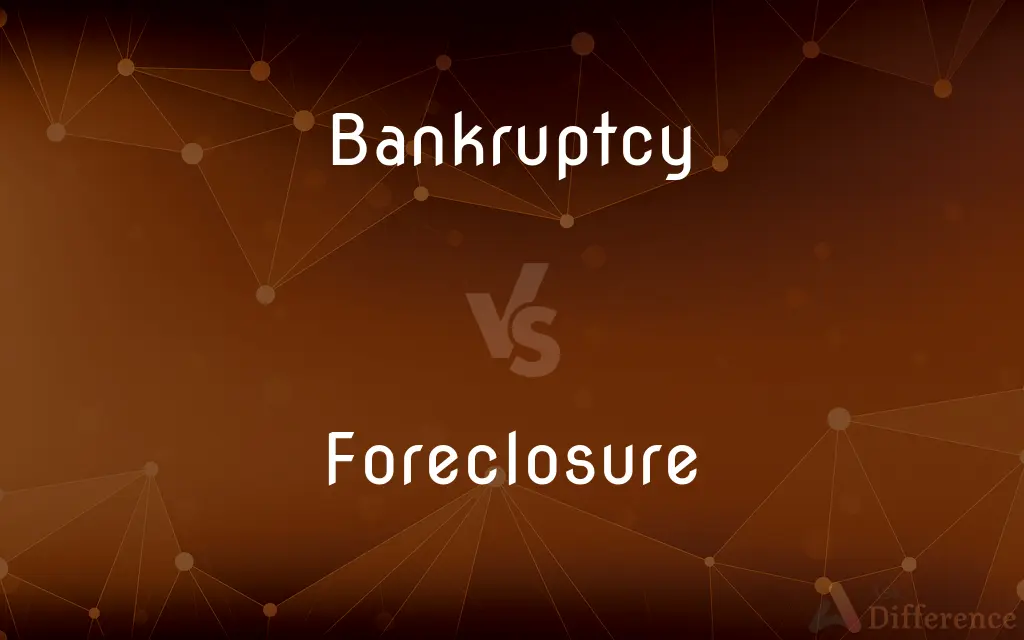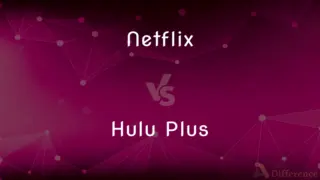Bankruptcy vs. Foreclosure — What's the Difference?
By Tayyaba Rehman & Urooj Arif — Published on February 15, 2024
Bankruptcy is a legal process for individuals or businesses to seek relief from debts they cannot pay. Foreclosure is recovering loan balances by selling the borrower's collateral asset.

Difference Between Bankruptcy and Foreclosure
Table of Contents
ADVERTISEMENT
Key Differences
Bankruptcy and foreclosure are legal processes that serve different purposes. Bankruptcy is a broader financial remedy allowing individuals or entities to either restructure or eliminate debts under the protection of the bankruptcy court. There are several types of bankruptcy, including Chapter 7 and Chapter 13 for individuals, which differ in terms of liquidating assets or setting up repayment plans. Bankruptcy can stop foreclosure, halt collection activities, and provide a fresh start by discharging certain debts.
Foreclosure, on the other hand, is specifically related to mortgage debt and occurs when a borrower fails to make mortgage payments, leading the lender to seize and sell the property as a means to recoup the unpaid loan amount. Foreclosure affects the borrower's credit rating and ability to purchase a new home in the future but is generally limited to the loss of property and does not necessarily relieve the borrower of all financial obligations associated with the defaulted loan.
The key difference between the two is that bankruptcy can involve all types of debts and provides a structured way for debt relief or repayment, while foreclosure exclusively involves property used as security for a loan and results in the loss of that property. Bankruptcy can sometimes prevent or delay foreclosure, offering homeowners a chance to catch up on missed payments or reorganize their finances.
Both processes have significant impacts on an individual's or business's financial standing and credit score. Bankruptcy filings and foreclosure proceedings are public records, affecting one's ability to obtain future loans, credit, and possibly employment. The choice between filing for bankruptcy or allowing a property to go into foreclosure depends on one's overall financial situation, objectives, and the advice of legal and financial professionals.
In summary, while both bankruptcy and foreclosure are legal mechanisms addressing financial distress, bankruptcy offers a way to manage or eliminate debts, whereas foreclosure specifically addresses the non-payment of a mortgage loan, leading to the loss of property.
ADVERTISEMENT
Comparison Chart
Purpose
To relieve or reorganize debts
To recover the balance of a loan through asset sale
Process Initiated By
Debtor or creditors
Lender or loan servicer
Debts Involved
All types or specific categories
Mortgage loans
Impact on Credit
Significant negative impact
Significant negative impact, specifically related to homeownership
Outcome
Debt relief, repayment plan, or liquidation
Loss of property used as loan collateral
Compare with Definitions
Bankruptcy
Involves liquidation or repayment plans.
Chapter 7 bankruptcy led to the liquidation of my non-exempt assets.
Foreclosure
Specific to mortgage or secured loan defaults.
Foreclosure proceedings began when I defaulted on my home loan.
Bankruptcy
Can stop foreclosure and collection actions.
Bankruptcy proceedings halted the foreclosure on my house.
Foreclosure
Results in loss of property.
Foreclosure forced me to move out of my family home.
Bankruptcy
Requires court approval for debt discharge.
The court approved my bankruptcy petition, discharging most of my debts.
Foreclosure
Can sometimes be stopped by filing for bankruptcy.
I filed for bankruptcy to stop the foreclosure process.
Bankruptcy
Legal process for debt relief or restructuring.
Filing for bankruptcy helped me eliminate overwhelming credit card debt.
Foreclosure
Legal process to recover mortgage loan balance.
The bank initiated foreclosure after several missed mortgage payments.
Bankruptcy
The state of being bankrupt.
Foreclosure
Leads to a public auction of the property.
My house was sold at a public auction due to foreclosure.
Bankruptcy
A legal proceeding that allows for a person or entity to be declared bankrupt.
Foreclosure
The act of foreclosing, especially a legal proceeding by which a mortgage is foreclosed.
Bankruptcy
The system of adjudication that declares instances of bankruptcy
Went into bankruptcy.
Foreclosure
A property that has undergone foreclosure
Decided to purchase a foreclosure.
Bankruptcy
A legally declared or recognized condition of insolvency of a person or organization.
Foreclosure
(legal) the proceeding, by a creditor, to regain property or other collateral following a default on mortgage payments
Bankruptcy
The state of being actually or legally bankrupt.
Foreclosure
(psychoanalysis) The absence of a symbolic father for a fatherless child, as a cause for psychosis.
Bankruptcy
The act or process of becoming a bankrupt.
Foreclosure
The act or process of foreclosing; a proceeding which bars or extinguishes a mortgager's right of redeeming a mortgaged estate.
Bankruptcy
Complete loss; - followed by of.
Foreclosure
The legal proceedings initiated by a creditor to repossess the collateral for loan that is in default
Bankruptcy
A state of complete lack of some abstract property;
Spiritual bankruptcy
Moral bankruptcy
Intellectual bankruptcy
Bankruptcy
Inability to discharge all your debts as they come due;
The company had to declare bankruptcy
Fraudulent loans led to the failure of many banks
Bankruptcy
A legal process intended to insure equality among the creditors of a corporation declared in bankruptcy
Bankruptcy
Affects all types of debts.
Bankruptcy addressed my personal and business debts.
Common Curiosities
Can bankruptcy stop a foreclosure?
Yes, filing for bankruptcy can temporarily stop foreclosure.
Can I buy a house after bankruptcy or foreclosure?
Yes, but it may take several years to qualify for a mortgage again.
Is it better to file for bankruptcy or let my house go into foreclosure?
It depends on individual circumstances and long-term financial goals; consulting with a financial advisor or attorney is recommended.
Does foreclosure eliminate all mortgage debt?
Not always; borrowers may still owe a deficiency balance if the sale doesn't cover the loan.
How long does bankruptcy stay on your credit report?
Chapter 7 stays for 10 years, and Chapter 13 for 7 years.
Can foreclosure be reversed?
Once completed, it's difficult to reverse foreclosure, but there are options to avoid it, like loan modification.
What happens to my credit score after foreclosure?
Foreclosure significantly lowers your credit score and impacts your ability to obtain future loans.
Do all bankruptcies affect home ownership?
Not necessarily; Chapter 13 can help keep your home by restructuring debts.
How soon after foreclosure can I buy another home?
It varies by lender, but typically 2-7 years depending on circumstances and loan type.
Are there alternatives to bankruptcy and foreclosure?
Yes, alternatives include loan modification, refinancing, or selling the property before foreclosure.
Is foreclosure always a public process?
Yes, foreclosure proceedings and sales are public records.
Can I rent after bankruptcy or foreclosure?
Yes, but options may be limited, and higher deposits may be required.
What is a deficiency judgment in foreclosure?
It's a judgment against the borrower for the remaining loan balance after asset sale.
How do I rebuild my credit after bankruptcy or foreclosure?
Start with secured credit cards, small installment loans, and timely payments.
Can I keep any property after filing for Chapter 7 bankruptcy?
Yes, exemptions allow you to keep certain essential properties up to a value limit.
Share Your Discovery

Previous Comparison
Netflix vs. Hulu Plus
Next Comparison
Chapter 11 Bankruptcy vs. Chapter 7 BankruptcyAuthor Spotlight
Written by
Tayyaba RehmanTayyaba Rehman is a distinguished writer, currently serving as a primary contributor to askdifference.com. As a researcher in semantics and etymology, Tayyaba's passion for the complexity of languages and their distinctions has found a perfect home on the platform. Tayyaba delves into the intricacies of language, distinguishing between commonly confused words and phrases, thereby providing clarity for readers worldwide.
Co-written by
Urooj ArifUrooj is a skilled content writer at Ask Difference, known for her exceptional ability to simplify complex topics into engaging and informative content. With a passion for research and a flair for clear, concise writing, she consistently delivers articles that resonate with our diverse audience.
















































